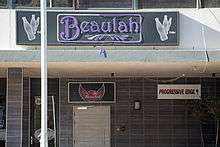Gayle language
| Gayle | |
|---|---|
| Region | South Africa: mainly in Johannesburg, Pretoria, Cape Town, Durban, Bloemfontein, and Port Elizabeth |
Native speakers |
None[1] 20,000 second or third-language speakers |
| Language codes | |
| ISO 639-3 |
gic |
| Glottolog |
gail1235[2] |

Gayle, or Gail, is an English and Afrikaans-based gay argot or cant slang used primarily by English and Afrikaans-speaking homosexual men in urban communities of South Africa, and is similar in some respects to Polari in the United Kingdom, from which some lexical items have been borrowed. The equivalent language used by homosexual South African men who speak Bantu languages is called IsiNgqumo, and is based on a Nguni lexicon.[4][5][6]
Gayle originally manifested as moffietaal (Afrikaans: literally, "homosexual language") in the drag culture of the Cape Coloured community in the 1950s. It permeated into white homosexual circles in the 1960s and became part of mainstream white gay culture through South African Airways "koffie-moffies" (Afrikaans: literally, "coffee gay men", a slang name for male flight attendants) in the 1970s.[4][5][6]
Besides a few core words borrowed from Polari (such as the word varda meaning "to see", itself a borrowing from Lingua Franca), most of Gayle's words are alliterative formations using women's names, such as Beulah for "beauty", Priscilla, meaning "police", and Hilda for "hideous". Men, especially other homosexual men, are often referred to by female pronouns in some circles, as is the custom among many homosexual countercultures throughout the world.[4][5][6]
Gayle arose for the same reason that most antilanguages develop in marginalised communities—to have a secret language in an oppressive society. However it also fulfilled other functions such as to "camp up" conversation, and provide entertainment in a subculture where verbal wit and repartee are highly valued.[4][5][6]
Sample
Varda that Beulah! translates to "Look at that beautiful man!"[6]:23–24
Abigail translates to abortion, Betty Bangles or Priscilla refers to the police, Belinia translates to beautiful or really gorgeous, Conch translates to Vagina, Moira translates to Music, Hilda translates to Ugly, Griselda translates to Hideous (Hilda's even uglier older sister), Great Dane translates to big penis, Olive translates to attractive man, Betty Boems translates to Sex, KFC translates to Sex, Cha Cha Palace translates to Discotheque or Club, Dora translates to Drink or Drunk, Doreen translates to Drunk, Dorette translates to Small Drink, Petula Clark translates to Passed Out, Vera or Veronica translates to Vomit, Sheila translates to Shit, Petunia translates to Urinate/Pee, Mitzi translates to Small, Monica translates to Money, Jella translates to hurry up, Jessica translates to jealous
See also
References
- ↑ Gayle at Ethnologue (18th ed., 2015)
- ↑ Nordhoff, Sebastian; Hammarström, Harald; Forkel, Robert; Haspelmath, Martin, eds. (2013). "Gail". Glottolog. Leipzig: Max Planck Institute for Evolutionary Anthropology.
- ↑ de Bruyn, Pippa; Bain, Keith (2012). Frommer's South Africa. Hoboken: John Wiley & Sons, Inc. p. 135. ISBN 9781118074787. Retrieved 24 June 2014.
- 1 2 3 4 Cage, Ken (10 August 1999). "Gayle – Gay SA Slang". Q Online (Mail & Guardian). Archived from the original on 18 August 2000. Retrieved 18 August 2000. Check date values in:
|access-date=(help) - 1 2 3 4 Cage, Ken (1999). An investigation into the form and function of language used by gay men in South Africa (M.A. thesis). University of Johannesburg. Retrieved 25 June 2014.
- 1 2 3 4 5 Cage, Ken; Evans, Moyra (2003). Gayle: The Language of Kinks and Queens: A History and Dictionary of Gay Language in South Africa. Houghton, South Africa: Jacana Media. ISBN 9781919931494. Retrieved 25 June 2014.
| ||||||||||||||||||||||||||||||||||||||||||||||||||
| |||||||||||||||||||||||||||||||||||||||||||||||||||||||||||
.svg.png)